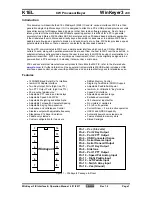
D2212B/D2212BE Operation and Installation Guide
Page 16
© 2002 Bosch Security Systems
39934E
D2212B/D2212BE
3.2.2
EMI (Electro Magnetic Interference)
AC wiring can induce EMI (both noise and low level voltage) into adjacent wiring. Run phone and sensor loop wiring away
from AC conductors, including the transformer wire. Run keypad wiring away from AC and phone wiring.
EMI may also occur if you install the panel or run system wires near the following:
• Computer network system
• Fluorescent fixtures
• Telephone cabling
• Ham radio transmitter site
• Heavy machinery and motors
• High voltage electrical equipment
• PBX telephone system
• Public service (police, fire departments, etc.) using radio communications
• Radio station transmitter site, or other broadcasting station equipment
• Welding shop
If you think that EMI may be a problem, use shielded cable. The drain wire for the shielded cable must have continuity from
the earth ground terminal on the control panel, to the end of the wire run.
3.3
Connect to Earth Ground
To help prevent damage from electrostatic charges or other transient electrical surges, connect the panel to earth ground at
the panel’s earth ground terminal before making any other connections.
A grounding rod or cold water pipe are recommended earth ground references.
Bosch Security Systems does not recommend a telephone or electrical ground for the earth ground connection. Use 18 AWG
(1.2 mm) wire maximum under the terminal. Use a spade lug or splice for a larger wire.
Do not connect any other panel terminals to earth ground. The panel’s common terminals and earth ground terminal are
electrically isolated.
3.4
Transformer
(16.5 VAC)
Connect the transformer to the terminals marked 16.5 VAC before plugging it into the power source.
Use 18 AWG (1.2 mm) wire to connect the transformer to the panel. Wire length
should be kept as short as possible. Maximum wire length is 50 ft. (15 m).
Never share the transformer with other equipment: Foreign grounds on
the AC input may damage the panel’s power circuit.
3.5
Battery
Place the battery upright in the base of the enclosure. First plug the connector on the
negative (black) battery wire to the negative (-) side of the battery.
Next plug the connector on the positive (red) battery wire to the positive (+) side of
the battery.
3.6
Charge the Battery as You Work
3.6.1
Lock the Standby Switch
Locking the pin in the standby position allows you to charge the battery as you install
the detection devices and keypads. Lock the pin down now (see Figure 3).
16.5VAC
+Alrm-
Data
+Aux-
Standby Switch
Normal (Open)
Standby Switch
Locked (Closed)
Figure 3: Standby Switch
Installation
















































